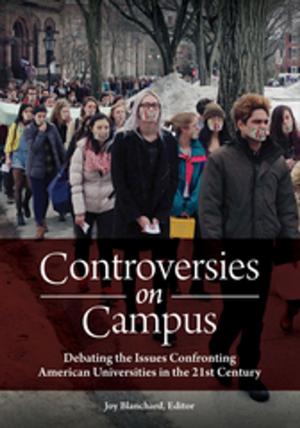Sacred Terror: How Faith Becomes Lethal
Nonfiction, Social & Cultural Studies, Social Science, Crimes & Criminals, Criminology, Reference & Language, Law| Author: | Daniel E. Price | ISBN: | 9780313386398 |
| Publisher: | ABC-CLIO | Publication: | July 19, 2012 |
| Imprint: | Language: | English |
| Author: | Daniel E. Price |
| ISBN: | 9780313386398 |
| Publisher: | ABC-CLIO |
| Publication: | July 19, 2012 |
| Imprint: | |
| Language: | English |
Religion-based terrorism is perceived as one of the most significant threats to U.S. homeland security in the 21st century. Sacred Terror: How Faith Becomes Lethal makes the central argument that religion-based violence and terrorism is primarily a result of political, socioeconomic, and psychological forces, thereby demystifying religion-based terrorism and revealing its inherent similarity to other forms of terrorism and war.
Daniel Price examines religious texts and traditions in Judaism, Christianity, and Islam; looks at the history of religion-based terrorism; and explores why religion facilitates violence. He builds upon this foundation to explain how religion as an ideological force that motivates violence is not as powerful as commonly believed, and that religious fervor is not unlike other non-religious ideologies such as Marxism, nationalism, and anarchism. The work also presents in-depth analysis of the political, socioeconomic, and psychological forces that are behind religion-based violence, and discusses case studies from multiple religions that illustrate the author's argument.
Religion-based terrorism is perceived as one of the most significant threats to U.S. homeland security in the 21st century. Sacred Terror: How Faith Becomes Lethal makes the central argument that religion-based violence and terrorism is primarily a result of political, socioeconomic, and psychological forces, thereby demystifying religion-based terrorism and revealing its inherent similarity to other forms of terrorism and war.
Daniel Price examines religious texts and traditions in Judaism, Christianity, and Islam; looks at the history of religion-based terrorism; and explores why religion facilitates violence. He builds upon this foundation to explain how religion as an ideological force that motivates violence is not as powerful as commonly believed, and that religious fervor is not unlike other non-religious ideologies such as Marxism, nationalism, and anarchism. The work also presents in-depth analysis of the political, socioeconomic, and psychological forces that are behind religion-based violence, and discusses case studies from multiple religions that illustrate the author's argument.





![Cover of the book Business and Corporate Integrity: Sustaining Organizational Compliance, Ethics, and Trust [2 volumes] by Daniel E. Price](https://www.kuoky.com/images/2014/march/300x300/9780313395987-zIXH_300x.jpg)

![Cover of the book Workplace Communication for the 21st Century: Tools and Strategies that Impact the Bottom Line [2 volumes] by Daniel E. Price](https://www.kuoky.com/images/2013/january/300x300/9780313396328-UzbU_300x.jpg)


![Cover of the book Clothing and Fashion: American Fashion from Head to Toe [4 volumes] by Daniel E. Price](https://www.kuoky.com/images/2015/november/300x300/9781610693103-CVbp_300x.jpg)
![Cover of the book Alcohol and Drugs in North America: A Historical Encyclopedia [2 volumes] by Daniel E. Price](https://www.kuoky.com/images/2013/august/300x300/9781598844795-gxnO_300x.jpg)

![Cover of the book Religion and Politics in America: An Encyclopedia of Church and State in American Life [2 volumes] by Daniel E. Price](https://www.kuoky.com/images/2016/july/300x300/9781598844368-N19a_300x.jpg)

